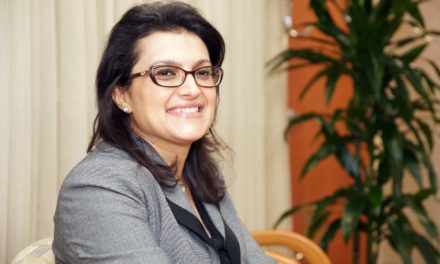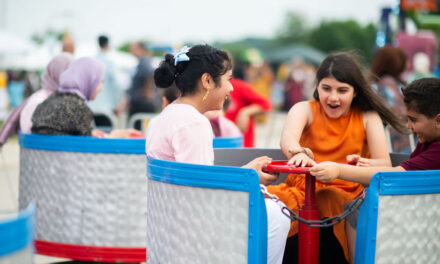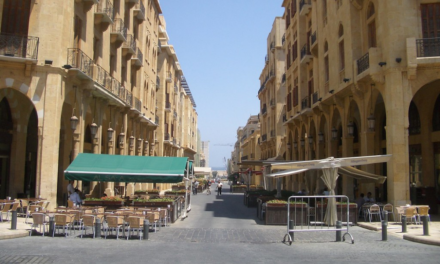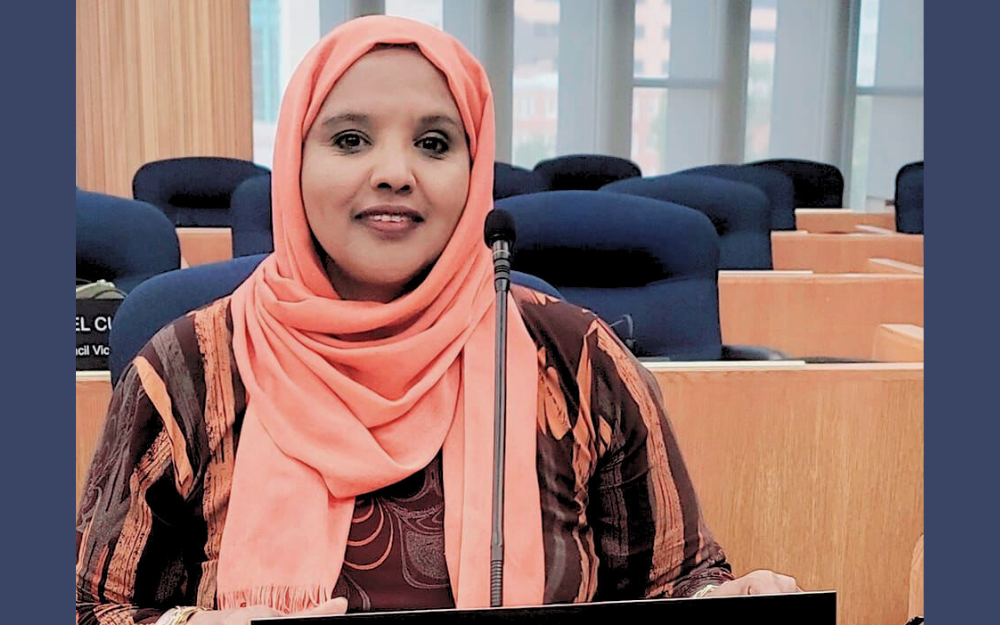
Madison alder Nasra Wehelie announces her candidacy for the Wisconsin Assembly.
Nasra Wehelie, a Madison Common Council alder and a Democrat, kicks off her campaign for a seat in the Wisconsin legislature Monday, April 1. If elected, she will be the first female Muslim state representative.
Rep. Samba Baldeh (D-Madison), elected in 2021, is the first Muslim member of the Wisconsin legislature. Like Wehelie, he also served on the Madison Common Council (where he was president from 2018 to 2019).
Wehelie, 53, is running against Michael Bare, an incumbent, to represent newly drawn District 80 in Wisconsin’s State Assembly. Both are Democrats. However, the new district includes constituents not previously in Bare’s district, and that matters, Wehelie noted in an interview Sunday with the Wisconsin Muslim Journal. “It is a new district,” she said.
A Somali immigrant and mother of four, Wehelie has lived in Madison for over three decades. She began public service in 2020 by filling an open seat on Madison’s Common Council, selected out of 11 applicants to represent Madison’s west side. She ran unopposed for that seat in 2021 and continues to serve on the Common Council.
A March 20 press release from her Wisconsin State Assembly campaign lists endorsements from multiple public officials, including Madison Mayor Satya Rhodes-Conway, Fitchburg Mayor Julia Artta-Fratta and some of Wehelie’s colleagues at the Madison Common Council (Council president and alder Jael Currie and Alders Barbara Harrington-McKinney, John W. Duncan, Michael E. Verveer, Marsha A. Rummel, William Tishler, Amani Latimer Burris, Isadore Knox Jr., Charles Myadze and John P. Guequierre.
The public is invited to her kick-off event, Monday, April 1, 4:30 – 6 p.m. at Silk Road Restaurant, 1920 S. Park St., Madison. RSVP at nasraforwi.com.
In her interview with WMJ, Wehelie talked about the new District 80, what she aims to accomplish in the State Legislature and why she wants to move to the Assembly.

(Map source: WSAW-TV)
Gov. Tony Evers signed Wisconsin’s new legislative district maps into law on Feb 19, 2024.
Q & A with State Assembly candidate Nasra Wehelie
Gov. Evers signed Wisconsin’s new electoral maps into law in February. How was District 80, which you are running to represent, impacted?
The new map reflects a commitment to ensuring there is representation for all. District 80 shifted toward the City of Madison, including additional urban areas. Previously it had been more rural.
I’m not running for the old District 80. That is one of the things I want to clarify. People say I am running against an incumbent but he did not represent many of the residents in the new district.
If you win the primary, what will you do about your position on the Madison Common Council?
For the sake of my District 7 constituents, I will finish my term but won’t seek reelection. I’m up for election in the spring of 2025.
I also run an equity consulting firm. If I win the election, I’ll also decide what I need to do about that. I want to make sure my time is committed to serving District 80 and learning the process of being a policymaker at the state level.
What about your volunteer work on the Wisconsin League of Municipalities and the Boys and Girls Club of Dane County?
Working in the community is my passion. I will continue serving in nonprofit organizations. They give me proximity to people affected by some of the systematic barriers in our society.
Are you involved in Madison’s Islamic community?
Yes. We have an active Muslim community. We have three mosques and I participate in all three. I try to go to all of them at different times.
After 9/11, I founded the Muslim Youth of Madison. I wanted to bring young people into the space of being empowered and having a safe space to feel good about their American as well as their Muslim identity. That work is a key accomplishment in my life. All of those kids are now grown-ups with successful professional and personal lives.
What would you bring to the Wisconsin Assembly?
My advocacy work for equity access and opportunity. Most of my Common Council colleagues will tell you I focus on those issues.
I want to be a voice for the people, to bring my dedication and make a profound impact on the lives of Wisconsin residents. I am committed to working hard, working collaboratively and leading with integrity. I am privileged to be at the table. I have to exercise my responsibility to serve those who are not served otherwise.
What distinguishes you from your opponent?
I have been in Madison for 35 years and, for more than two decades, I have been with nonprofits. So, I understand the nuances of the challenges those people served by nonprofits face, whether it’s housing, women’s issues, education to small business, I have interfaced with so many of them for many, many years.
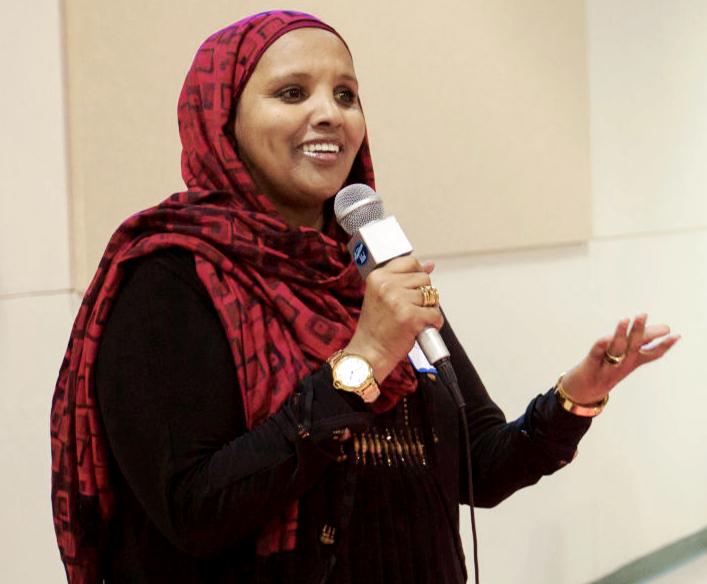
My education and lived experience prepared me with the necessary skills and knowledge to tackle complex issues. My undergraduate degree is in economics and international relations. Then my MBA helps me consider how I can create impactful outcomes for the constituents.
For example, when I joined the Madison Common Council, I was able to analyze the needs of District 7. One of those issues was, even though we had a lot of parks, none of the parks had a bathroom. I was able to put in a budget amendment to build a community park where people can gather. The facility is Country Grove Park, the most used recreational park we have. Now when people are using the park, when youth are there to play soccer, they don’t have to use a portable toilet. We have our own bathroom.
You were the author of Madison’s unanimous resolution calling for a ceasefire in Gaza, one of the first in the nation. Why did you want propose it?
Some local residents are affected by what’s happening internationally. I received numerous calls and emails from constituents about it. In any case, for me I couldn’t stay silent. As Martin Luther King Jr. said, “Injustice anywhere is a threat to justice everywhere.”
I admire and appreciate the progressive values Madison has. Justice is the core of our work in Madison.
What have you accomplished on the Madison Common Council that you are most proud of?
Besides the park I mentioned, I’m especially proud of the work we have done on the Economic Development Committee. One key success was putting funding into the ACRE Program (Associates in Commercial Real Estate). It is a professional training program with the goal of expanding and supporting minority representation in the commercial real estate industry. It gives people of color the skills to manage, invest in and develop real estate assets. I was able to put almost $300,000 in the budget for it in the Department of Civil Rights, which made it available to people in Madison since 2020. Some people graduating from that program become developers and bring business to their community.
If elected as the District 80 representative, you will be the first Muslim woman in the Wisconsin State Assembly. Is that important to you?
It is and it isn’t. I’m happy to be part of that history but it’s not the aim. What is important to me is serving all residents in District 80 and serving Wisconsin, analyzing situations we face and finding sustainable solutions.

(Map source: The Geographic Information System)
Dane County Area in the new Wisconsin Assembly District Map
What role does your Islamic faith play in your public service work?
A person’s faith shapes their values, beliefs and moral principles. In Islam, these values include social justice, equality and compassion. My Muslim faith teaches me to have compassion for the people I serve, regardless of who they are. It requires me to champion equity, access and opportunity. Everyone has their own challenges in life. I want to alleviate some of those challenges. That’s why when I’m making decisions, I always look into the unintended consequences and consider who is at the table and who is not at the table.
How do you stay informed about what vulnerable constituents face?
By staying close to them. For example, I worked with Just Dane, an organization that, among other works with individuals coming from prison and transitioning back into society. That experience really changed my worldview to be more empathetic.
Why do you want to move from working at the city level to the state level?
Most of the city’s policies are influenced by state policy and many issues, like criminal reform, are addressed by the state rather than by the city. My hope is that I can be more effective in understanding some of the challenges we face in systemic barriers and make a difference for the individuals affected.
What are the big challenges facing the State of Wisconsin right now?
One is housing. How can we make housing affordable and attainable to everyone in Wisconsin? In Wisconsin, more houses and apartments are being built but we still have a housing crisis. We need to get to the root causes and understand the problem. Some states have adopted inclusionary zoning policies. We can look into what is working in other states and see if it would work in Wisconsin.
I also want to address women’s issues like childcare, leadership and representation, and health.
Another is criminal justice reform and public safety policies. I want to champion policies that expand educational and vocational training programs within the prison so people who are incarcerated can be successful when they reenter society. We need programs to support them with housing, employment and mental health treatment. I’d also like to engage the community in public safety.
And I’m very passionate about improving the education system, creating more opportunities for students and teachers to succeed. For example, as a parent, I was very involved in my children’s education but not all parents are as privileged. We need to give resources to teachers and students so they can thrive. Also, we need to develop good alternatives to higher education.
When Tony Evers was Wisconsin’s Superintendent of Schools, I served on the Parents Advisory Council. I also served on the Madison Metropolitan School District’s Human Relations Council. We were looking at policies to help kids be successful. I’d like to see disciplinary alternatives to punishments such as suspensions to create something more conducive to learning.
Why should people vote for you?
I have lived, community-based experience that helps me understand the nuances of the challenges and issues people face. I will work hard to assess the needs of the district and the State of Wisconsin as well. I am a person who takes what I do seriously. I want to make sure I do the best I can for the people who have put their trust in me, listening to their needs and working collaboratively with my colleagues to get things done.
How will you manage the rift between Wisconsin’s Democratic and Republican parties as a policymaker?
I have been good at working with people from all walks of life and different perspectives. Serving at the Wisconsin League of Municipalities, I have the privilege of visiting small villages and towns to understand some of the issues they have. I know when and how to listen, and also when to take action. I am outcome-oriented.
